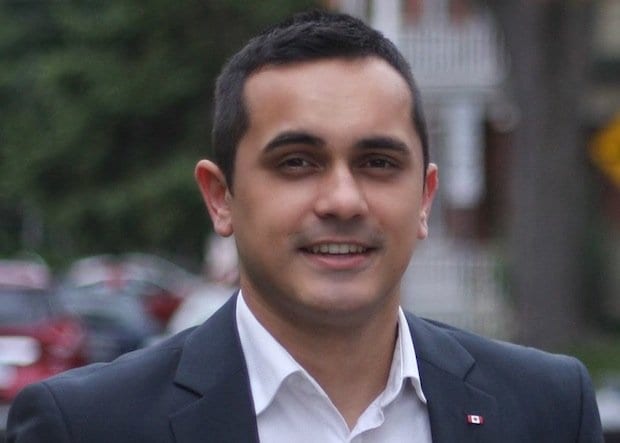In the lead-up to the Oct 27 election, the LGBT community is coming out strong in the race for school trustee. School board zones 3, 7 and 11 all have gay candidates in the running (Donna Blackburn, Curtis Bulatovich and Sylvia Martin, respectively), and now another has thrown his hat into the ring.
Guy Hughes, 24, has long been active in Ottawa’s LGBT community. He coordinated Capital Pride’s Partnership Awards and gala as a volunteer in 2011, followed by a stint as the organization’s vice-chair of communications, from October to December 2011, that ended with his resignation, which he says was because of family reasons. He was also the president of the gay-straight alliance at Sir Robert Borden High School, a position that gave him an inside look at how LGBT and queer students fare in the city’s education system.
Hughes is running in Zone 10, which includes the downtown wards of Somerset and Kitchissippi. “I’ve been interested in the issues around education since I was in elementary school,” he says. “My work with gay-straight alliances was really important. I remember — I think I was 14 or 15 years old — the first time I went to a Jer’s Vision gay-straight alliance network conference for the Ottawa region, and it was like my happy place. Seriously — it was the first time I really felt comfortable at high school.”
When Hughes was a high school student, he says, the big issue for queer students had to do with language and the word gay being used as a pejorative. Today, he says, the key issues are gender-neutral washrooms in schools and more support for transgender students, including teachers being better informed on trans issues.
Hughes also wants to see more comprehensive sex-education programs that include not only discussion of STIs like HIV and hepatitis C, but also talk about suicide among LGBT youth. He points to the 2011 suicide of gay Ottawa teen Jamie Hubley as an example. “There are going to be more of these cases, and they’re not going to stop until we have the resources and the support that we need.” He points to a recent survey done by the Toronto District School Board, which found that LGBT students were less likely than their heterosexual classmates to graduate from high school. “That shows that there are some support programs that are needed,” he says.
Hughes says more support is needed for extracurricular programming and access to counselling services for students. “Those could be services from the city, from the school board or from NGOs . . . like Planned Parenthood Ottawa,” he says. He also wants to see the curriculum interpreted in a way that includes more of an emphasis on social equality, including the rights of aboriginal people, the LGBT community and people living with disabilities.
Another area Hughes wants to see change is in volunteer-hour requirements for high school students, which he feels could be more. “It’s only 40 hours, and for a high school student, 40 hours over four years of high school — well, that’s 10 hours a year. And I’m not sure that’s quite enough to teach the . . . really Canadian values [that] everyone is worth the same and all people were born equal even though they might be born different than others.”
Teaching students basic financial skills, such as how to use credit wisely and run personal household budgets, is another part of Hughes’s platform. He feels high schools can do more to teach students financial literacy and wants to see young people learn how to manage and avoid debt, in addition to being better prepared for the decision of whether to attend university or college, based on current job markets. “Kids come out of high school completely unprepared . . . Teachers do their best, but I think that the way we interpret the curriculum needs to prepare kids better.”
Zone 10 encompasses a diverse downtown area that is at the centre of the city’s transportation debate. Hughes has pledged to promote active transportation for students in the area, including cycling and walking initiatives. He says he would like to see more walking school buses, a concept wherein a group of students, led by adult volunteers, walk to school instead of relying on motorized transportation.
The area also includes many LGBT families with school-aged children, and Hughes says he’d like to see special-interest community consultation meetings held regularly by the school board to give the LGBT community a chance to voice its concerns. However, he emphasizes that he is committed to representing all students if elected. “Just because I’m a member of the larger alphabet soup . . . community doesn’t mean that I’m going to be an advocate solely for queer rights,” he says. “My number-one priority is that students come first, period.”
The Ottawa Municipal Election takes place Monday, Oct 27. For more information, visit ottawa.ca.
For more on Guy Hughes, visit guyhughes.ca.


 Why you can trust Xtra
Why you can trust Xtra


